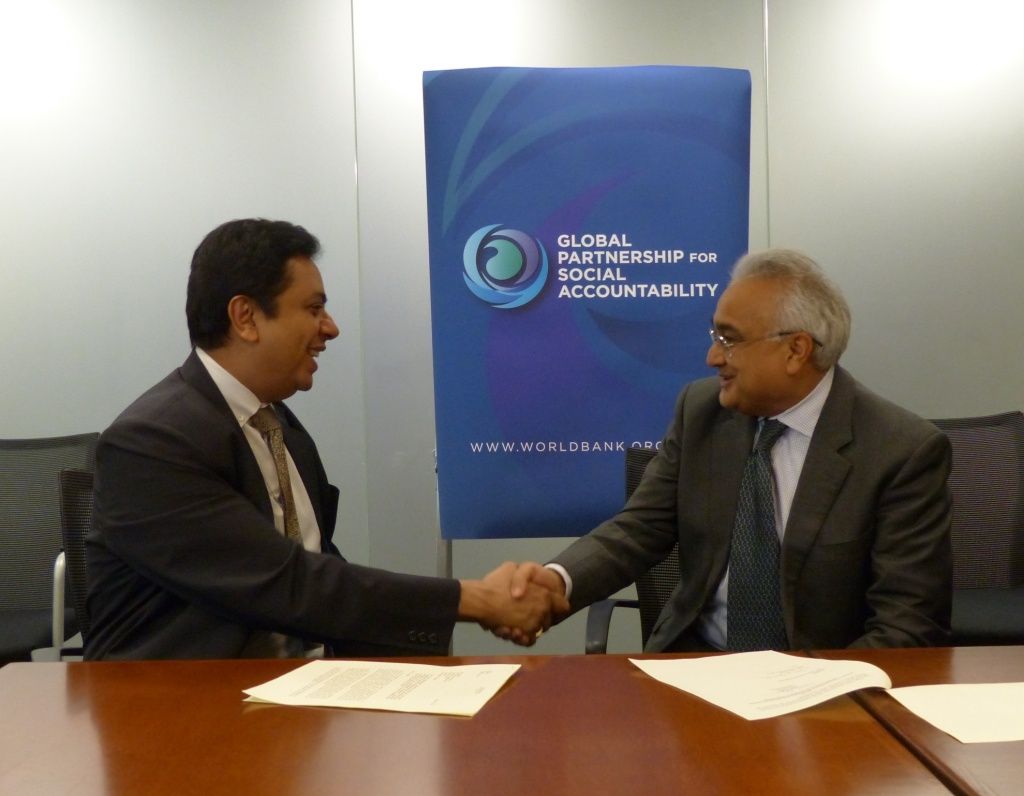
Representing the World Bank Group, Mr. Sanjay Pradhan, Vice President for Change, Knowledge and Learning, shakes hands with Dr. Mirza Jahani, CEO of Aga Khan Foundation U.S.A. after signing an agreement making AKF USA a donor and partner to the Global Partnership for Social Accountability.
Following months of preparation, several of us from the Aga Khan Foundation U.S.A. (AKF USA) recently walked a few short blocks to the World Bank’s Washington, DC offices, where we signed an agreement making AKF USA a donor and partner to the new Global Partnership for Social Accountability (GPSA) as it supports civil society and capacity building.
Our walk that day marked a step toward what I hope will add to an already remarkable relationship with the World Bank, and now in an area central to the Aga Khan Development Network’s mission. Supporting civil society is core to our approach to development. This agreement, the Bank’s first one with AKF USA, places the issues of civil society organizations (CSOs) firmly on the Bank’s development agenda.
Social accountability refers to a society’s ability to ensure that those in authority deliver what they promise. In developed countries, that role has often been blazed by the middle classes. But having lived and worked in six developing countries, I have had the honor of witnessing social accountability at a very local level: communities responding to how their local school is governed, or the way a clinic prioritizes local health needs. I have seen ordinary citizens in small communities in Africa step forward and ask, “Excuse me, why are the doors not fixed in the school?” Or “Why is the teacher regularly absent in a particular class?” For me, that is civic engagement and social accountability—it’s the everyday observance and reporting that in the end makes services better.
It is fundamental to ensure that there is a desire within the community for change and a capacity for advocacy. Some people say, “These people are poor and have very little capacity to take action.” In my experience working with poor communities, I have seen that they are very resourceful and very resilient. What they need are tools for thinking about the resources they have and how to use those resources, as well as methods for better organization.
Under the new agreement, AKF USA contributes $500,000, including $250,000 in-kind support to the GPSA, a multi-million program managed by the World Bank. Among other things, our support will help to train CSOs to better engage with media and strengthen the role of media in promoting accountability and transparency. (See the press release for details about the agreement.)
As noted at the event, the Global Partnership for Social Accountability creates a bridge from the World Bank’s work with national governments to the civil society organizations active within those countries. It builds momentum for giving people a voice while simultaneously giving governments a better ear to listen to their people so that civic engagement can be better actualized. The real value of the Bank’s Social Accountability initiative is that it gets right to the grassroots and helps people to understand how they can ask questions. The work of the Aga Khan Foundation in various countries has involved mobilizing people, providing an awareness of what their rights are, and strengthening their ability and structures for learning more – whether it’s through women’s associations, health committees or teacher/parent associations on schools. These bodies allow people to ask reasonable questions and thereby make local government institutions more responsive to their own citizens.
At the same time, social accountability can only have impact if governments gain the capacity to be more responsive to their constituents. I have often noted that as development agencies, “we have spent so much energy giving people a voice, that we forgot that governments need an ear.” How that ear comes to be will vary from place to place, but it is very apparent that we must equally turn our attention to helping governments develop the capacity to listen better to their peoples. Then we will have the right equation in place.
Enlightened governments will, we hope, see this value and want the tools, both in human capacity and technology, which come with social accountability. Mobile technology, for example, allows people to text their views of conditions in their isolated community to a regional hub that can adjust service delivery.
We know that results do not abide by arbitrary deadlines. We don’t expect specific outcomes in a year, or even five years. Still, we need to study the impact of these efforts and communicate their results, to demonstrate the value of these mechanisms.
The Aga Khan Foundation also hopes that the example of the GPSA demonstrates to governments that they can find it worth their while to engage with civil society partners. Governments can find the process very useful to accomplishing their own missions with their constituents. In the end, we want to create a safe space – an enabling environment – for that interaction between citizens and government.
By Dr. Mirza Jahani, CEO of Aga Khan Foundation U.S.A.